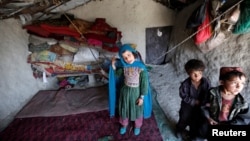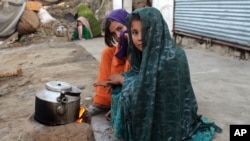The number of Afghans displaced within their country has increased sharply over the past three years, says Amnesty International.
The rights group reported on Tuesday that Afghanistan has 1.2 million internally displaced people. That is almost double the number in 2013.
The report comes at a time of concerns over increasing violence by the Taliban this year.
Champa Patel is Amnesty International’s South Asia Director. She said that growing numbers of displaced Afghans are living in very bad conditions.
Afghans are one of the world’s largest refugee populations. The United Nations refugee agency estimates that 2.6 million Afghans are living in neighboring Pakistan and Iran.
Champa Patel said, “While the world’s attention seems to have moved on from Afghanistan, we risk forgetting the plight of those left behind by the conflict.”
In recent years, Afghanistan’s central government has promised to help internally displaced people. But these Afghans still lack food, water, health care, and chances to seek education and employment, Amnesty said.
The report said the situation facing internally displaced Afghans has worsened in recent years. It said less aid and essential things, such as food, are available.
Amnesty blamed reported corruption, a lack of ability in the government and decreasing international interest in Afghanistan’s national IDP Policy. The latest policy was launched two years ago.
Instead, the report said, forced evictions by both the government and private groups are a daily threat to internally displaced people.
Amnesty said the Ministry of Refugees and Repatriation has the job of coordinating the IDP policy. But the ministry lacks financial resources and has been accused of corruption, the group said.
Most of the internally displaced population is in need of basic health care. Also, schooling for children has been suspended since their families were forced to leave their homes.
Champa Patel said, “They have lost the traditional sources of their livelihoods, and only have few opportunities for informal work, creating circumstances where women are excluded, and children are being exploited and not educated.”
Amnesty International has called on Afghan officials and the international community to act quickly. It said these groups must work to meet the most urgent needs of displaced Afghans.
The Afghan government has yet to comment on the Amnesty International report.
I’m Mario Ritter.
Ayaz Gul reported this story for VOANews.com. Mario Ritter adapted it for Learning English. George Grow was the editor.
We want to hear from you. Send us your thoughts in the comment section below.
_____________________________________________________________
Words in This Story
plight – n. a bad or difficult situation
essential – adj. absolutely necessary, something that cannot be done without
implementation – n. the process of carrying out a plan
evictions – n. to force someone to leave a place
exploited – adj. used, used in an unfair or improper way






